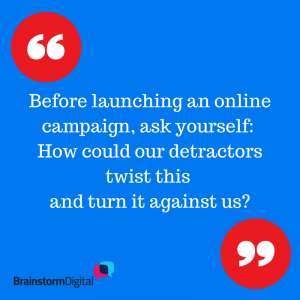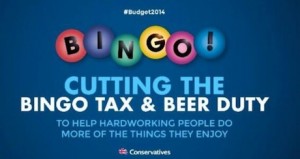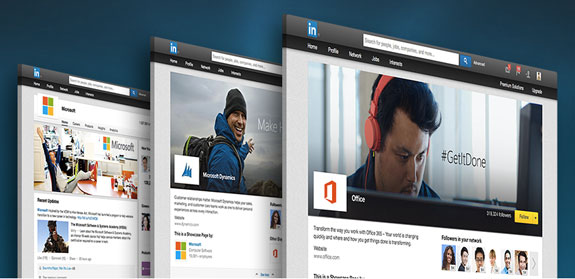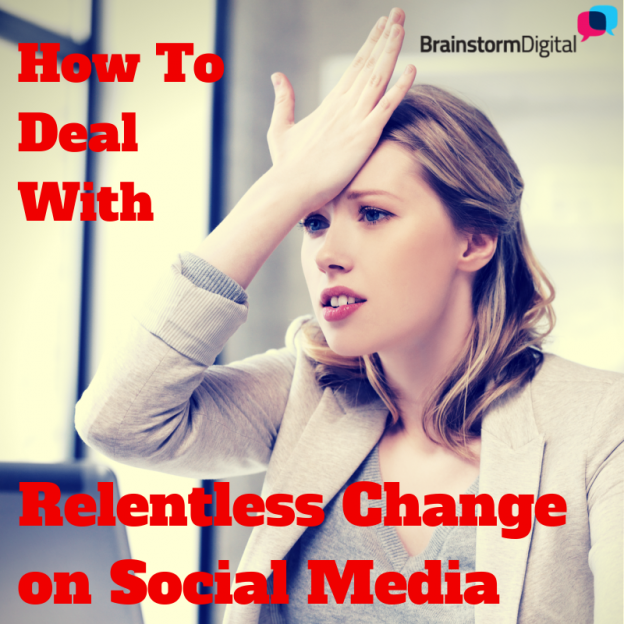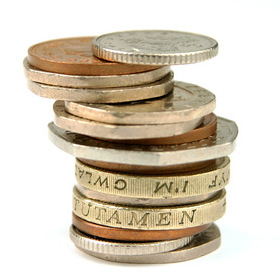When social media works for your company or organisation, it can be very, very good. When it’s bad – it horrid.
Last week Twitter played host to two spectacular train-wrecks. First, here in the UK, we had a government minister tweet a poster explaining that taxes were being reduced on bingo and beer, “to help hardworking people do more of the things they enjoy.”
Within minutes, spoof posters flooded Twitter, making fun of the elitist assumptions about what “hardworking people” enjoy.
Then, America’s Vogue magazine released its new edition with Kanye West and Kim Kardashian on the cover, branding them #theworldsmosttalkedaboutcouple (someone should tell editor Anna Wintour that hashtag is way too long to be effective, but that’s a different lesson!).
Cue a massive Twitter backlash from fashionistas who consider the couple too downmarket for the magazine, with more spoof covers, other celebs tweeting that they were cancelling their subscriptions, and a slew of people hijacking the hashtag to proclaim Beyonce and Jay-Z #theworldsmosttalkedaboutcouple. Ouch!
Of course, it’s not just government or iconic companies that risk a social media backlash if they play their hand wrong. It can happen – and has happened – to companies of every size, from McDonald’s and Tesco to a little Arizona bakery that became infamous for responding to criticism on Facebook with a tirade of slurs and threats. The hit to a company’s reputation can be very hard to recover from.
So what can you do to protect yourself? And what do you do when your social media campaign nevertheless backfires? Here are 10 lessons that every company needs to draw from these social media #fails.
Before you post
#1 Have crisis management guidelines in place
The worst time to figure out how to manage a crisis is during that crisis! You won’t be able to work out, in advance, what you are going to say, but when you set up your social media programme, you need to establish a clear procedure for what to do when things go wrong online.
Put together a team that will be responsible – including senior management figures and representatives of legal and other relevant departments. Make sure that the team updating your social media accounts know who to call, and when – and what to do if they are not available.
Make sure they can recognise what constitutes a true crisis that demands immediate attention – you do not want a junior member of staff to delay calling you because they weren’t sure whether it was serious.
Then write it all down in your social media policy, and ensure everyone relevant is familiar with the document, and knows where to access it if necessary.
#2 Anticipate negative publicity
Easier said than done, right? Nevertheless, some crises can be averted with foresight.
Before you publish anything online – and certainly before you launch a major campaign – always ask yourself, how can our detractors twist this, turn it against us, use it in ways we do not approve of?
In some cases it will be obvious. If you are asking for people’s opinions, you always run the risk that their opinion will not be to your liking. (Remember when McDonald’s asked fans to send in #McDStories – and got a stream of horror stories in reply?)
If you make claims that do not stand up to scrutiny (“#theworldsmosttalkedaboutcouple”), you risk getting burned.
If your company or organisation already suffers from bad publicity or a poor reputation, consider how your post can feed into existing stereotypes and complaints (see both McDonald’s and #Torybingo). Be brutally honest with yourself about your company’s weaknesses and its standing with the public.
WHEN THE CRISIS ERUPTS
#3 Understand you may not be able to contain it
Once your Twitter hashtag has been hijacked or your poster lampooned, these things take on a life of their own and to some extent is out of your control.
McDonald’s, for example, actually pulled its #McDStories hashtag within a couple of hours – and yet the case lives on in infamy.
This is important to recognise so that your management team has realistic expectations. Damage can be limited – but quite possibly, cannot be entirely undone.
#4 Say sorry
If you have said something wrong online, admit it. Openness, accountability and an ability to admit mistakes will make you look responsive and responsible, and considerably shorten your crisis. Of course, the best way to show you are really sorry is to commit to fixing the problem if possible – and then actually do so.
You may feel you have nothing to say sorry for. Vogue editor Anna Wintour, for example, defended her decision to feature Kardashian and West in an editorial that anticipated the backlash. (In any case, to turn against them publicly would be very bad form).
In such cases, you can still acknowledge the feelings being expressed by the public even if you respectfully disagree, and promise to take on board what’s being said for the future. If you validate people’s feelings and show they are being heard, you’ve won half the battle.
#5 Do not attack back
Responding aggressively in the heat of the moment, or attacking the public who lashed out against you will make you look even more out-of-touch.
Take the Conservative minister who tweeted the bingo poster, Grant Shapps. He responded to the uproar by accusing the Opposition of attacking his tweet because they had no substantial economic policies of their own.
If only he had said, “You’re right, the wording on the poster was off,” before defending his policies, he would have taken much of the sting out of the criticism. Instead, he showed he did not understand what the public (not the Opposition, which only jumped on the bandwagon after the momentum swelled on Twitter) was upset about.
#6 Do not erase the evidence or try to silence opposition
If you have just attracted hundreds of derisive comments on Facebook, you must not delete them even if you technically can. You will look like you can’t deal with criticism (….which would be true!) or appreciate feedback or public opinion, and open yourself up to considerably more anger.
(Perhaps something for the Prime Minister of Turkey to keep in mind. His attempt to block Twitter last week in the runup to an election led to a considerable upsurge in Twitter activity, and naturally, even more anger against him.)
#7 Respond on social media
The wave of criticism took place on social media? That’s where you need to respond. A press release to the national newspapers will not do the job if the turmoil is all centred on Twitter (which is why Anna Wintour’s editorial has barely registered).
Be careful about responding to individuals. In some cases, this is a must – when there are complaints about customer service they have personally experienced, for example. But when you are engulfed by a wave of mockery or hostility from thousands of people at once, not only can you not respond to everyone, you will encounter lots of trolls, lots of people jumping on the bandwagon – and lots of high emotion. If you’re not careful you could make things worse.
#8 Communicate with your own staff
In the middle of a negative publicity storm, it is essential that the people working for you, as well as other stakeholders, are reassured that things are under control; hear your side of the story; and have relevant talking points to defend you with.
Make sure, again, that they know what they are allowed to say and what they are not allowed to say publicly. The last thing you need is an employee under pressure making another disastrous comment online, inadvertently fanning the flames.
AFTER THE CRISIS
#9 Learn the lessons
Was the social media crisis because of something you can fix? Fix it!
Be ruthless about investigating what went wrong and analysing your response. Make sure that you have a better approach and better plan in place next time round.
What measures do you have in place to protect your company in case of a social media crisis? What advice do you have for others? Please share in the comments!
If you liked this piece, you might enjoy:
- How to create a social media strategy that actually gets read
- How to stand out from the crowd on social media
- How much time does social media really take? The brutal truth



